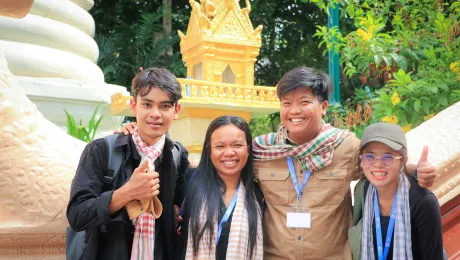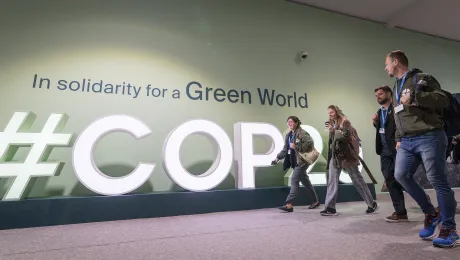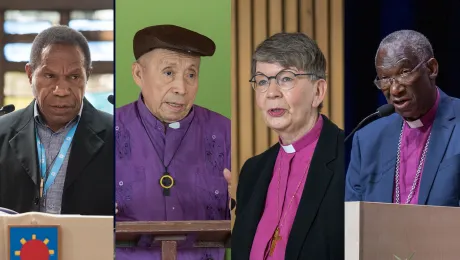Young people in the Lutheran Church of Rwanda are using new skills to build their capacity as agents of peace and community volunteers through the LWF Peace Messengers program.
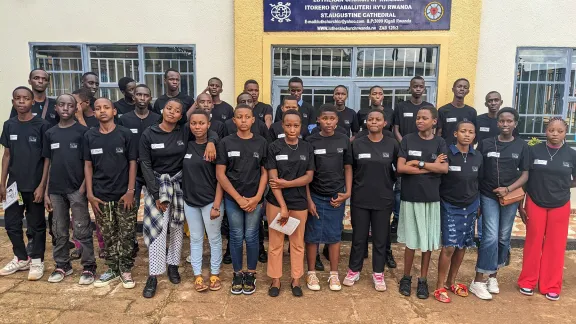
Participants in the Lutheran Church of Rwanda ‘Sparks of Peace’ youth initiative engage in community work. Photo: LCR/ Geoffrey Munyaneza
Local LWF Peace Messengers use new skills to promote reconciliation in the community
(LWI) – A youth-led initiative of the Lutheran Church of Rwanda (LCR) is providing young people with peace building skills, mobilizing them to promote reconciliation, and engage in community work.
Over 50 people aged 14-18 have participated in several community-based initiatives under the “Sparks of Peace” project, which was begun in April this year by LCR participants in The Lutheran World Federation (LWF) Peace Messengers Program.
The Sparks of Peace project has created a space for young people to discuss and understand the underlying concepts and how they can be applied in their daily lives.
Geoffrey Munyaneza, Lutheran Church of Rwanda
“Beyond its primary focus of training about peace building and conflict resolution, the project has created a space for the young people to discuss and understand the underlying concepts and how they can be applied in their daily lives,” said Geoffrey Munyaneza.
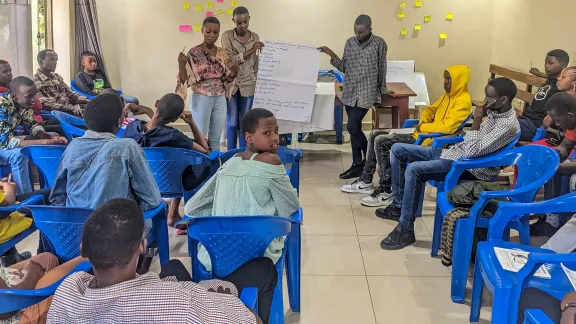
LCR youth in the April 2023 training sharing how they will use the skills gained to promote peace and resolve conflicts. Photo: LCR/ Geoffrey Munyaneza
Munyaneza and four other youth launched the initiative after participating in the fourth international LWF Peace Messengers training workshop hosted by the LCR in the capital Kigali in December 2022. Like similar trainings for youth from LWF’s member churches since 2017, participants learn and practice peace building skills such as active listening, finding common ground, analyzing conflict to identify issues of power and human rights, and seeking creative solutions together using the Training Manual for Participants. As incentive to utilize their newly acquired skills, the LWF provides a small grant for youth to start and lead a local peace building project such as ‘Sparks of Peace.’
The LCR project started with an initial group of 32 participants from Kigali parish and its environs, with more from other parishes gradually joining. One of their learning visits was to Nyamata Mvura Nkuvure village ( mvura nkuvure means ‘heal me, I heal you’) in southeastern Rwanda, a community comprising survivors and perpetrators of the 1994 genocide, who had fled the country but have since returned. The youth heard from a local leader about the village's history and inspiring journey toward peace building, reconciliation and unity.
“This was a unique opportunity for the young people to engage with people who had been directly affected by the genocide and learn from their experiences. They saw firsthand how the community was able to reconcile after the genocide. It was eye-opening as they learned about the importance of forgiveness, dialogue, and unity in achieving peace,” noted Theophile Mugabo, who is also among the project’s initiators.
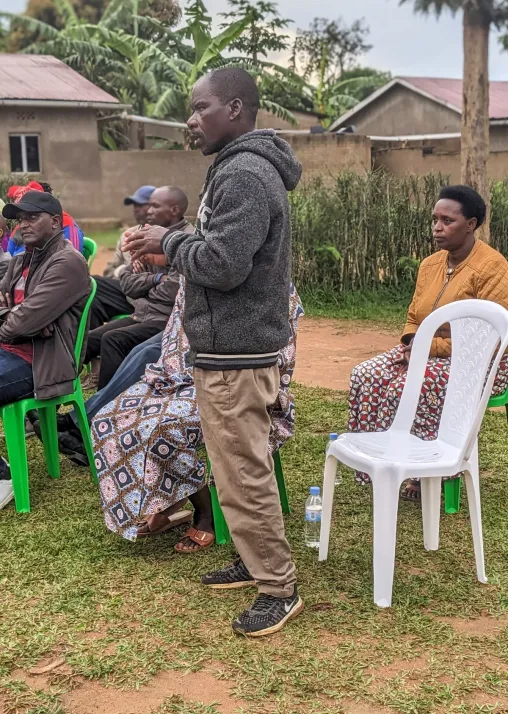
LCR Peace Messengers who participated in the April 2023 training that led to the launch of the LWF-supported Sparks of Peace project. Photo: LCR/ Geoffrey Munyaneza
Community work is part of the project’s activities. In Nyamata, the LCR group participated in building a cow shed for one family, which was an opportunity for some of them to learn new skills as they collaborated in assisting those in need.
Munyaneza said they hope to convert this initiative into a ministry that brings young individuals together and facilitates learning about peace building. “In addition, it can serve as a platform to discuss other matters that impact youth and give them a unified voice,” he added.
Ms Savanna Sullivan, LWF Program Executive for Youth described the Sparks of Peace initiative “as an example of the local to global to local approach we are trying to implement as the LWF youth network.” Inspired by their peers from the global Lutheran communion, the LCR Peace Messengers are creatively addressing peacebuilding in their own communities and involving more young leaders along the way, she said.
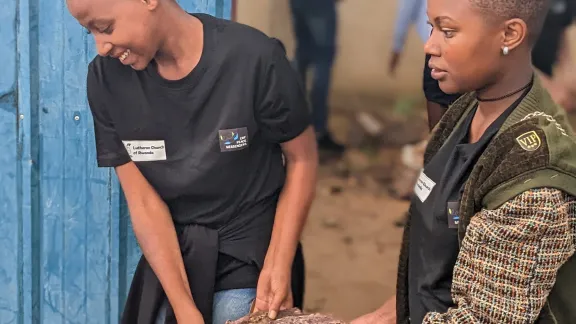
LCR Peace Messengers who participated in the April 2023 training that led to the launch of the LWF-supported Sparks of Peace project. Photo: LCR/ Geoffrey Munyaneza
“Youth in the LWF are building a movement of peace and it is exciting to see the ways that they continue to define what it means to be a leader, a Lutheran, and a disciple of Christ in the world,” Sullivan added.
Started in 2017, the Peace Messengers program is aimed at building the capacity of youth from LWF member churches to actively participate in creating more peaceful and just societies. Through annual international training workshops, participants gain the necessary knowledge and practical skills for constructive conflict resolution in everyday life and advocating for peace within their communities and beyond.
